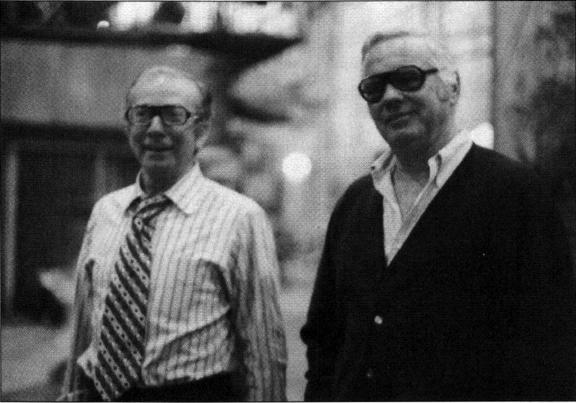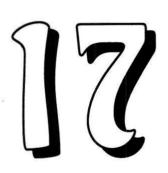Growing Up Brady: I Was a Teenage Greg, Special Collector's Edition (20 page)
Read Growing Up Brady: I Was a Teenage Greg, Special Collector's Edition Online
Authors: Barry Williams;Chris Kreski

Mr. Rudolph's penchant for intrusive control came to a head
when he attempted to give direction to ... a mouse. We were filming an episode in our second year entitled "The Impractical Joker."
The plot was loosely based around Jan, who tries to be funny by
hiding Greg's school-science-project mouse, only to have the little
white vermin get loose in the process.
It came time to shoot the rodent's big scene, and Mr. Rudolph
had it all mapped out. The mouse was to enter the Brady living
room, give a winsome look into camera, pause, turn left, and exit
into the kitchen. The mouse had other ideas.
Wandering aimlessly about the set and completely ignoring
Oscar's direction, the mouse soon had Mr. Rudolph's brow furrowed and the top of his head turning red. Still determined to get
the shot exactly as he'd envisioned, Mr Rudolph got personally
involved, coaching the mouse with directions of "C'mon, mousey....
C'm'ere, mousey.... This way, mousey.... Up, up, UP.... Now
pause.... Now go again." Robert Reed, who was watching the
goings-on with raised eyebrows, commented, "My God, the man is
giving acting lessons to a mouse!"
But Oscar Rudolph wasn't the only presence on the set that
drove the Brady kids crazy. For example, Susan Olsen also had a
tough time with Howard Leeds, our show's producer. What
you've got to understand is that Howard is a wonderful character,
and the classic, stereotypical Hollywood producer. Handsome,
funny, swank, silver-haired, and stylish, he could usually be found
with a babe on each arm and his shirts unbuttoned to the navel,
showing off six or eight gaudy gold chains. Essentially, he acted
shallow, insincere, arrogant, and I admired him tremendously.
For all his flash and glitter, however, Howard Leeds could not
for the life of him relate to the younger kids. On more than one
occasion that drove Susan Olsen batty.
"Howard Leeds wanted to change things," she remembered.
"He wasn't happy with my hair color. He wasn't happy with anything about me, and made my life kind of miserable for a while. I
generally refer to him these days as `Howard the Dick.'
"I remember he was always trying to tell me how to do my
lines, and then I'd go on the set, do what he'd told me, and end up sounding like a cocktail waitress. And of course the director
would look at me like I was crazy and say, `No, Susan, don't do it
like that.' So I was getting confused with the mixed messages.
Sherwood
Schwartz and
Howard Leeds,
April 1971.
(© Karen
Lipscomb)

"I also remember when I first realized that he didn't like me. I
went running up to him with my little hair curl-things doinging
away as I ran, and when I caught him I said, `Hi, Mithter Leeds!!!'
probably getting spit all over him. And then he said to me `Uh, hi,
pussycat. Listen, when you smile on camera, don't ever squish
your eyes up because it makes you look really ugly.' And I was like
crushed, and walked away thinking, `Well, he sure doesn't like
me."'
Knowing Howard, I'm certain he had a much different intention
behind his remarks, and thought, in his bull-in-a-china-shop way,
that he was being supportive.
The most frightening on-set Brady story of all happened early in
our first season. I still don't understand it completely. I had arrived
at Paramount bright and early one morning in June, and by a quarter to eight had gotten ready and into wardrobe, smoked a
cigarette in the alley, and settled into the schoolroom, when an
assistant director came barreling into the room, wide-eyed and out
of breath. His chest was heaving as he told me to report to the set,
"pronto!"
"Huh?" I asked, not sure that I knew the definition of "pronto."
"Just do it," he replied intensely.
We were shooting an episode entitled "Eenie Meenie Mommy
Daddy," and John Rich was directing. A large man with a bear-like
physique. John's directoriae style is extremely forceful, imposing,
and demanding. Anyway, the assistant had failed to come get me,
and only now, in a mad dash to try and cover up his costly error,
had he found me.
Put two and two together and you know that when I got to the
set, Mr. Rich was furious-with me! He knew nothing of the AD's
deriliction of duty, and theorized that I had ignored his call. Okay,
all that makes sense, but this is where it starts getting nuts.
We were about to shoot a scene wherein Greg was preparing
for a baseball game, and when I got to the set, Mr. Rich was clutching one of my props, a Louisville Slugger.
"You're late," he boomed. "Where were you?" he demanded,
his intonation implying that I was something akin to a bug.
"I was in the schoolroom," I replied. "I didn't get a call."
"When I want you out here I want you out here, five minutes
ago, not ten minutes from now!!" he fumed illogically. And then
this rage-encrusted adult took the baseball bat and flung it at
me.
Nice guy.
Maureen McCormick on the Dressing Make-Out Session
I remember toward the end of the series, Barry and I were in
his dressing room, which was really just this tiny little trailer that
they'd parked next to the "Brady Bunch" set. And we were on the
floor, kissing, making out, and it was so funny. I mean, just think
about it: there we were in this little trailer on stage 5, and right
outside were all of our parents and our teachers, not to mention
the cast and crew, and we were in there making out with the door
locked, and our teacher, Frances Whitfield, came and knocked on
the door and said something like "Uh, hellooooo," and they were
looking for one of us, and we actually said-with the door locked,
mind you "Oh, Okay, we'll be right there, we're just ... uh ... talking."
Then I remember Karen Lookinland (Michael's mother) coming
to the door and knocking for us too, harder, and it really struck me
as strange, having to hide like that.
But good for us.
Fortunately, his aim was as flawed as his reasoning, and I managed to dodge his throw at the last second. The bat crashed
behind me cracked, and spun away. I stared at it and left. It is the
only time in my career that I've walked off a set.

 ctors who work in series television are rarely afforded
ctors who work in series television are rarely afforded
the luxury of an official day off. Instead, the studio puts
you "on hold." What that means is that even though your
name is not on the day's shooting schedule, you must be
available to come into the studio at a moment's notice, just in case.
During the course of "The Brady Bunch," I was often put on hold.
However, throughout all those "hold days," I was actually only
called in to work twice. That was once too often.
The Bradys were in their fourth year of production, and at seventeen I had become physically adult, but remained emotionally
immature and adolescent. One particularly gorgeous day in the
summer of '72, I found myself on hold, and bored, until I was paid
an unexpected visit by that same bunch of miscreants that had, in
younger years, populated my brothers' "gang." You'll recall that
these are the same wayward souls that had previously introduced
me to girlie mags, cigarettes, bee stings, and the cumulative effects
of chugalugged Kamchatka.
Times had changed, and the vice of the day was now cannabis.
At seventeen years old, I had long since become immune to the
effects of peer pressure, and no longer felt it necessary to fit in
with this motley assemblage. Thus, I've gotta take the rap for this
particular fiasco myself. I had heard a lot about marijuana (who
hadn't in 1972), and wanted to try it for myself.
There were four of us sitting scattered around my bedroom
floor, comfortably lounging on my oversized, overstuffed, foamfilled floor pillows. It was late morning, around eleven; I had stacks
of records piled onto my automatic turntable, and we were grooving to the strains of the Moody Blues, Chicago, Buffalo Springfield,
and Fleetwood Mac. The door was locked. The windows were
open.
At this point, I was introduced to a thin, hand-rolled, yellow
joint. "Listen, man," said one of the buds, "toke slow-this is some
really heavy shit."
"Cooool," I thought, having learned nothing from my projectile
experience with alcohol. Determined to get the full effect of this
curious smoke, we all took deep drags, and we then held our
breath until our faces turned red. My immediate thoughts were
that this stuff really burned my windpipe and that it tasted something like singed hair. I then put those logical thoughts to rest by
reasoning that bad taste must equal potent effect.
Several drags later, the stuff had kicked in ... hard. I didn't get
high, so much as fuzzy, light-headed, and disoriented. Still, the
experience wasn't at all unpleasant; and as our fingers gave way to
a roach clip, and as the music blared from my sound system, I
thought to myself that this might be a pretty cool way to spend my
day off.
Then the phone rang.
"Huh? ... Who? ... Yeah? ... Hello?" I inarticulately sputtered.
"Barry? This is Bill McGarry down at the set." Whoa ... it was the
assistant director from "The Brady Bunch." Then he said, "we had
to change our shooting schedule, so we'll need you to come in
and shoot the driveway scene at one o'clock, first thing after
lunch."
"Uhhhhhhh, right, no problem, I'll be there in an hour."
`Jesus," I thought, "I'm gonna have to shoot a `Brady' scene
stoned!" With my heart pounding, I checked my watch. It was
eleven-thirty. Quickly, I grabbed hold of my script and checked out
how many lines I'd have to say. Only six. "Okay, Okay," I thought,
"I can handle that. In fact, this creative experiment might turn out
to be fun."
I made my excuses, got dressed, headed for the studio, and
found that the marijuana had, among other things, badly distorted
my perception of time: the forty-five-minute trip to Paramount
seemed literally three hours long. It was not a good omen.
Neither was the fact that once I got to the set, I found that the
crew had spent their lunch hour setting up for my scene and were
ready to film, ahead of schedule. Now there was no doubt: Greg
was gonna be one stoned Brady.